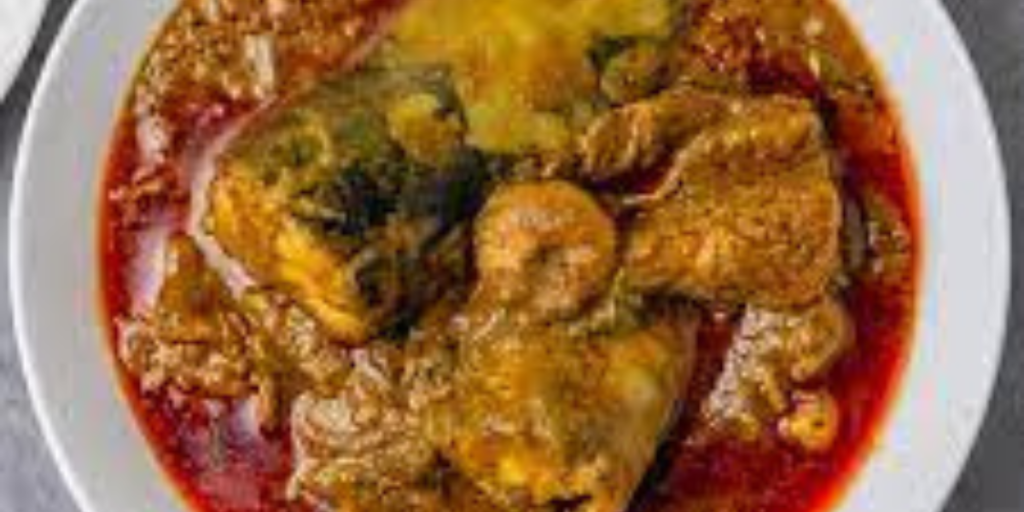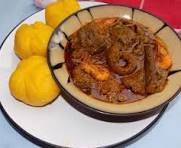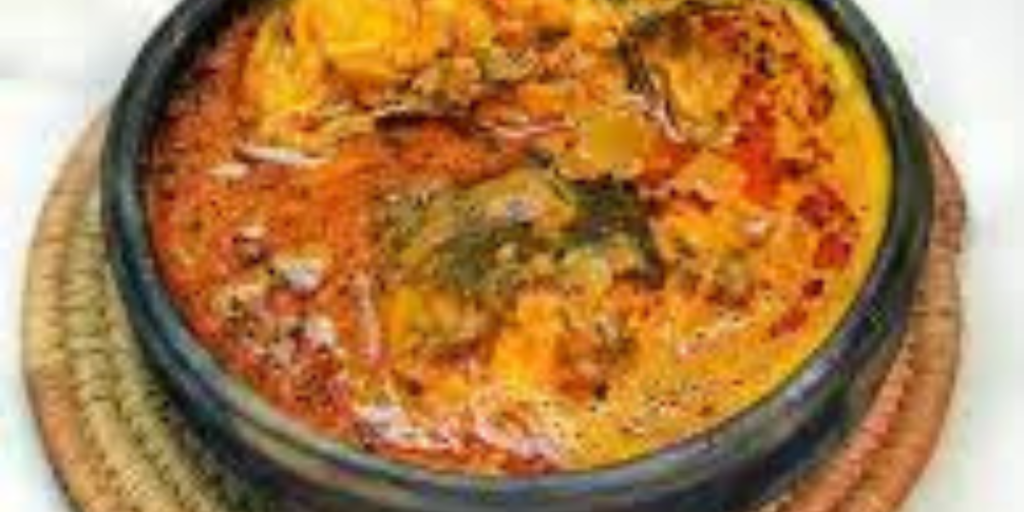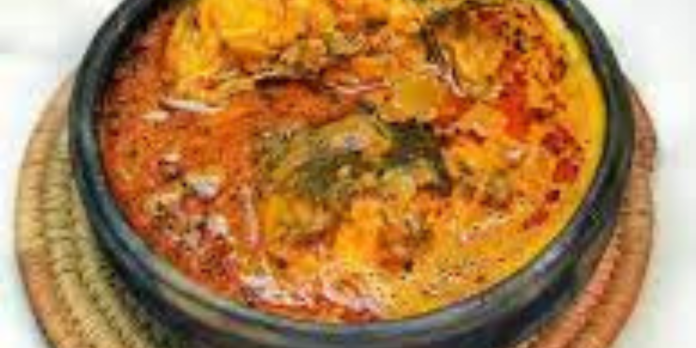Table of Contents
Banga Soup : Hello, food enthusiasts! My name is Kehinde Adedamola Quadri, and I am thrilled to share with you the best Delta Banga recipe. Born and bred in Effurun, Warri, Delta State, I have firsthand experience of the rich, tantalizing flavors that make Banga soup a beloved dish in our culture. In this comprehensive guide, we’ll explore everything you need to know to create an authentic and delicious Banga soup right in your kitchen. Let’s dive into the heart of Delta cuisine and unlock the secrets of this traditional delicacy.
What is Banga Soup?
Banga soup, also known as Ofe Akwu in Igbo or Amiedi in Urhobo, is a delectable soup made from palm nut fruit extract. It is a staple in many homes across Delta State and other parts of Nigeria, known for its rich, aromatic, and deeply satisfying flavors. The soup is often served with starch, pounded yam, or white rice, making it a versatile dish that can be enjoyed in various ways.
The History and Cultural Significance
Banga soup has a rich history and cultural significance in the Delta region of Nigeria. It is deeply rooted in the traditions of the Urhobo and Itsekiri people, among others. The soup is often prepared during important occasions such as weddings, festivals, and family gatherings, symbolizing unity and celebration.
Banga Soup And Starch Nigerian Best of 2024
The preparation of Banga soup is an art passed down through generations. It showcases the ingenuity and resourcefulness of the Delta people, who utilize locally sourced ingredients to create a dish that is both nourishing and flavorful. The use of palm nut fruit, a key ingredient in the soup, reflects the region’s reliance on and respect for nature.
Ingredients
Before we dive into the cooking process, let’s take a look at the essential ingredients needed to prepare the best Delta Banga soup:
- Palm Nut Fruit (Banga): The primary ingredient, providing the base for the soup.
- Beef or Goat Meat: Adds richness and depth to the flavor.
- Fresh Fish (Catfish is recommended): Enhances the taste and texture.
- Dry Fish or Stockfish: Adds a smoky flavor.
- Periwinkle (optional): Adds a unique texture.
- Banga Spices (Obeletientien leaves, Beletete leaves, Ataiko, and Irugeje): Essential for the authentic taste.
- Crayfish: Adds umami and depth.
- Ground Pepper: For heat.
- Onions: For sweetness and aroma.
- Seasoning Cubes: Enhances the overall flavor.
- Salt to taste: Balances the flavors.
Step-by-Step Cooking Process

Step 1: Extract the Palm Nut Juice
- Wash the Palm Nut Fruit: Start by thoroughly washing the palm nut fruit to remove any dirt or debris.
- Boil the Palm Nut Fruit: Place the washed palm nut fruit in a large pot, cover with water, and boil until the nuts are soft. This usually takes about 30-45 minutes.
- Pound the Palm Nuts: Once the palm nuts are soft, transfer them to a mortar and pound gently to extract the juice. Be careful not to break the nuts’ shells.
- Extract the Juice: Place the pounded nuts in a bowl and add warm water. Use your hands to rub the nuts and extract the juice. Sieve the mixture to separate the juice from the chaff.
Step 2: Prepare the Meat and Fish
- Season the Meat: Season your beef or goat meat with onions, seasoning cubes, and salt. Allow it to marinate for about 30 minutes.
- Cook the Meat: Place the seasoned meat in a pot, add water, and cook until tender. If using stockfish, add it at this stage.
- Prepare the Fresh Fish: Clean and cut the fresh fish into desired pieces. If using dry fish, soak it in hot water to soften and remove any sand.
Step 3: Cooking
- Heat the Palm Nut Extract: Pour the extracted palm nut juice into a large pot and bring it to a boil.
- Add Banga Spices: Add the Banga spices (Obeletientien leaves, Beletete leaves, Ataiko, and Irugeje) to the boiling palm nut juice. These spices are crucial for the authentic taste of Delta Banga soup.
- Add Meat and Fish: Add the cooked meat and fish (both fresh and dry) to the pot. Stir well to combine.
- Add Crayfish and Pepper: Grind the crayfish and add it to the pot, along with the ground pepper. Adjust the quantity of pepper to suit your taste.
- Season the Soup: Add seasoning cubes and salt to taste. Be careful not to over-salt, as the meat and fish may have added some salt already.
- Simmer: Allow the soup to simmer on low heat for about 20-30 minutes, or until the oil from the palm nut extract begins to float on top and the soup thickens to your desired consistency.
- Final Touch: Add periwinkle (if using) and allow it to cook for an additional 5 minutes.
Best puff puff Recipe for 500g flour.
Serving Suggestions
Banga soup is best enjoyed with:
- Starch: A traditional accompaniment in Delta State. Starch is made from cassava and has a sticky texture, perfect for scooping up the rich soup.
- Pounded Yam: A popular choice across Nigeria. Its smooth, dense texture pairs wonderfully with the soup.
- White Rice: A lighter option that complements the rich flavors of the soup.
Nutritional Benefits

Banga soup is not only delicious but also packed with nutrients. Here are some of the health benefits:
- Rich in Vitamins and Minerals: Palm nut fruit is a great source of vitamins A and E, which are essential for healthy skin and eyesight.
- High in Protein: The meat and fish provide a good amount of protein, necessary for muscle repair and growth.
- Contains Healthy Fats: The palm oil in the soup contains healthy fats that are good for heart health.
- High in Fiber: The various ingredients contribute to the fiber content, which aids digestion.
Variations
Banga soup can be adapted in many ways to suit different tastes and dietary preferences. Here are a few variations:
- Vegetarian Banga Soup: Replace the meat and fish with a variety of vegetables such as mushrooms, eggplant, and spinach.
- Seafood Banga Soup: Focus on seafood like prawns, crab, and squid for a rich, oceanic flavor.
- Spicy Banga Soup: Increase the amount of ground pepper and add fresh chili peppers for an extra kick.
Cooking Tips and Tricks
To ensure your Banga soup is the best it can be, consider these tips and tricks:
- Use Fresh Ingredients: Fresh palm nuts, meat, and fish contribute significantly to the flavor of the soup.
- Don’t Rush the Cooking Process: Allow the soup to simmer slowly to develop its rich flavors.
- Experiment with Spices: While traditional Banga spices are ideal, don’t be afraid to experiment with other spices and herbs to suit your taste.
- Adjust Consistency: If your soup is too thick, you can add a little water or stock to achieve your desired consistency. If it’s too thin, let it simmer a bit longer.
Best Puff Puff Recipe With Milk and Egg in 2024
Frequently Asked Questions (FAQs)
Q: Can I use canned palm nut concentrate instead of fresh palm nuts? A: Yes, you can use canned palm nut concentrate for convenience. However, fresh palm nuts give a more authentic and richer flavor.
Q: What are the health benefits of Banga soup? A: Banga soup is rich in vitamins A and E from the palm nuts, protein from the meat and fish, and various minerals from the spices. It is a nutritious and balanced meal.
Q: Can I freeze Banga soup? A: Yes, Banga soup freezes well. Store it in an airtight container, and it can last for up to a month in the freezer.
Q: What can I use if I can’t find all the Banga spices? A: If you can’t find all the Banga spices, you can use a pre-mixed Banga spice blend available in African grocery stores.
Q: Is Banga soup suitable for vegetarians? A: While traditional Banga soup contains meat and fish, you can make a vegetarian version by omitting the animal products and adding more vegetables.
Q: Can I use other types of meat in Banga soup? A: Absolutely! Banga soup can be made with various types of meat, including chicken, lamb, or even game meat.
Q: How can I make Banga soup spicier? A: To make Banga soup spicier, increase the amount of ground pepper or add fresh chili peppers to the soup.
Q: What is the best way to store leftover Banga soup? A: Store leftover Banga soup in an airtight container in the refrigerator. It can last for up to 5 days. For longer storage, freeze it.
Q: Can I reheat Banga soup? A: Yes, Banga soup can be reheated. Simply heat it on the stove over low heat until warmed through.
The Role in Delta State Festivals

Banga soup plays a significant role in various festivals and celebrations in Delta State. It is often prepared in large quantities to serve guests and participants. The preparation process itself becomes a communal activity, bringing people together and strengthening bonds.
During the Urhobo annual festival, known as “Iri,” Banga soup is a staple dish. It is believed to bring good luck and prosperity to those who partake in it. The soup’s rich, red color symbolizes life and vitality, making it a perfect dish for festive occasions.
Personal Anecdotes and Memories
Growing up in Effurun, Warri, Banga soup was a regular feature on our dining table. I remember the aroma that would fill our home as my mother prepared the soup, the sound of palm nuts being pounded, and the excitement of knowing that a delicious meal was on the way. These memories are cherished and have inspired my love for cooking and sharing this amazing dish with others.
One of my fondest memories is of family gatherings during the festive season. The whole family would come together, each person contributing to the preparation of Banga soup. The elders would share stories and pass down cooking secrets, ensuring that the tradition continued through generations. It was during these times that I learned the true essence of Banga soup – not just as a dish, but as a symbol of family, tradition, and culture.
The Science Behind It
The unique flavor of Banga soup is a result of the combination of various ingredients and cooking methods. Here’s a closer look at the science behind this delicious dish:
- Palm Nut Extract: The primary ingredient, palm nut extract, is rich in oils and natural flavors. When boiled and pounded, the nuts release their oils and flavors into the soup, creating a rich and aromatic base.
- Umami from Crayfish and Meat: Crayfish and meat contribute to the umami flavor, which is the fifth basic taste (alongside sweet, sour, bitter, and salty). Umami is known for its savory, mouth-watering quality, which enhances the overall taste of the soup.
- Spices and Herbs: Banga spices like Obeletientien and Beletete leaves contain essential oils and compounds that release their flavors when heated. These spices not only add depth to the soup but also provide various health benefits.
- Simmering Process: Slow simmering allows the flavors to meld together, resulting in a more cohesive and rich taste. The heat helps in breaking down the fibers in meat and fish, making them tender and infusing the soup with their flavors.
Cooking for Large Gatherings
Cooking Banga soup for large gatherings requires some adjustments and planning. Here are some tips to help you scale up the recipe and ensure a successful outcome:
- Increase Ingredient Quantities: Adjust the quantities of all ingredients based on the number of servings you need. For instance, if you’re cooking for 20 people, multiply the ingredient quantities by four.
- Use a Large Pot: Ensure you have a large enough pot to accommodate all the ingredients. A large, heavy-bottomed pot is ideal for even cooking and preventing burning.
- Cook in Batches: If you don’t have a large enough pot, you can cook the soup in batches and combine them later.
- Plan Ahead: Start the preparation process a day ahead. Extract the palm nut juice, season and marinate the meat, and prepare all other ingredients in advance.
- Maintain Consistency: When scaling up the recipe, be mindful of maintaining the balance of flavors. Taste as you go and adjust the seasoning as needed.
Pairing with Drinks
Banga soup pairs well with various drinks, both alcoholic and non-alcoholic. Here are some suggestions to enhance your dining experience:
- Palm Wine: A traditional Nigerian drink, palm wine is a perfect match for Banga soup. Its sweet, slightly tangy flavor complements the rich and savory soup.
- Beer: A cold beer can balance the spiciness and richness of Banga soup. Light lagers or wheat beers are excellent choices.
- Zobo Drink: Made from hibiscus flowers, zobo drink is refreshing and slightly tart, providing a nice contrast to the soup.
- Chapman: A popular Nigerian cocktail, Chapman is a fruity and fizzy drink that pairs well with the flavors of Banga soup.
- Fresh Juice: Freshly squeezed juices like pineapple, orange, or watermelon can add a refreshing and sweet note to the meal.
Exploring Regional Variations
While the Delta Banga soup is well-known, different regions in Nigeria have their own variations of this delicious dish. Here are some regional takes on Banga soup:
- Igbo Ofe Akwu: In Igbo culture, It is known as Ofe Akwu and is typically served with white rice. It often includes ingredients like uziza leaves and scent leaves for added flavor.
- Rivers State Banga Soup: In Rivers State, Banga soup may include additional seafood such as prawns and crabs, reflecting the region’s proximity to the coast.
- Benin Banga Soup: The Benin variation often includes native spices and herbs unique to the region, providing a distinct flavor profile.
- Niger Delta Banga Soup: This version is rich in seafood, including periwinkles, clams, and snails, showcasing the abundant marine resources of the Niger Delta.
Modern Twists on Traditional Banga Soup
While traditional Banga soup is timeless, modern chefs and home cooks are experimenting with new twists on this classic dish. Here are some innovative ideas to try:
- Banga Soup with Quinoa: Replace traditional accompaniments like starch or rice with quinoa for a healthier, protein-rich option.
- Banga Soup Risotto: Use the Banga soup base to create a flavorful risotto. The rich, creamy texture of the soup works perfectly with Arborio rice.
- Banga Soup Tacos: For a fusion twist, use Banga soup as a filling for tacos. Add fresh vegetables and a squeeze of lime for a refreshing contrast.
- Banga Soup Pizza: Use Banga soup as a sauce for pizza. Top with mozzarella, fresh herbs, and slices of cooked meat or fish for a unique and delicious pizza experience.
Banga Soup and Its Influence on Global Cuisine
The rich and unique flavors of Banga soup have the potential to influence global cuisine. As more people discover Nigerian and West African dishes, Banga soup stands out as a must-try delicacy. Chefs around the world are beginning to incorporate elements of Banga soup into their menus, showcasing its versatility and appeal.
Conclusion
Banga soup is a culinary gem from Delta State, Nigeria, that offers a burst of flavors with every spoonful. As someone born and raised in Warri, I can attest to the delight this soup brings to any meal. By following this guide, you can recreate this authentic Delta delicacy in your own kitchen and share a piece of our rich culinary heritage with your family and friends.
Enjoy your cooking, and let the flavors of Delta State bring warmth and satisfaction to your dining table!
References:
- Traditional Nigerian Dishes: A Cultural Exploration
- The Role of Food in Delta State Celebrations
- Nutritional Benefits of Palm Nut Extract
- Modern Twists on Classic Nigerian Recipes
- Pairing Nigerian Cuisine with Drinks: A Guide






















